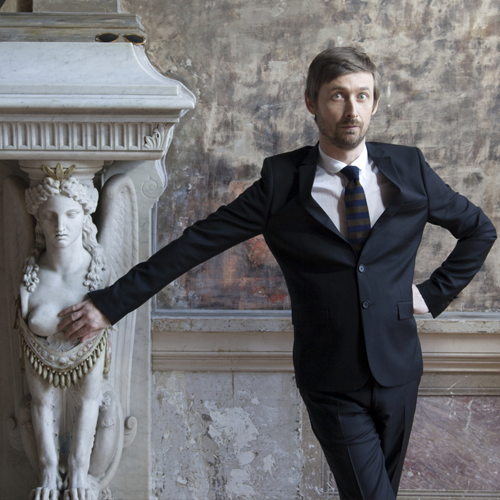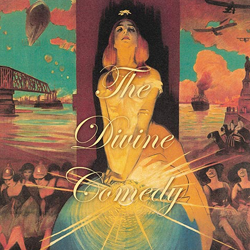
Website / Spotify / Facebook / Instagram
THE DIVINE COMEDY’S BIO
Born in Derry, Northern Ireland in 1970, Hannon is the son of a Bishop of the Church of Ireland. “Possibly not a typical pop star background,” he acknowledges. He is the founder and only consistent member of The Divine Comedy, who achieved unlikely pop stardom during the Britpop boom of the nineties with a slightly preposterous mix of archaic musical styles, hook-laden melodies and audaciously witty lyrics.
The Divine Comedy released ten albums between Fanfare for the Comic Muse in 1990 and Bang Goes The Knighthood in 2010. The past six years, though, have seen him explore other avenues. “My extra-pop activities are pressure valves allowing me to let off musical steam,” says Hannon. He penned the tunes for an acclaimed musical version of Swallows And Amazons, which premiered at the Bristol Old Vic in 2010.
“I don’t love a lot of musicals, but I do love writing them. I love the exuberance and naivety. I get to be a little more exaggerated emotionally, a little more Hello Dolly.”
A year later he set the words of German playwright Frank Alva Buecheler to music in the short but powerful chamber opera. Then in 2014, the Royal Festival Hall commissioned him to write a piece for their newly refurbished organ. The resulting work, To Our Fathers In Distress, he dedicated to his dad, Brian, who suffers from Alzheimer’s. “They gave me a choir so I turned it into a long hymn. Being brought up in a clergy family, I was raised on the Anglican hymnal, most of which I found out later was arranged by the brilliant Ralph Vaughn Williams. Like Vaughn Williams, I don’t do the religion but I certainly do the music.”

On a lighter note, he has made two much-loved cricket-themed albums with his friend Thomas Walsh of Irish band Pugwash, under the moniker The Duckworth Lewis Method. These slick ELO/Kinks inspired gems came, Hannon explains, from every musician need
“to lighten up and put your foot upon the monitor every once in a while.”
With Foreverland, Hannon has returned to what he does without compare: create intelligently, hook-laden, life-affirming pop music from a vast array of diverse and downright unlikely musical sources. “It was a matter of taking what I could do as far as it could go and challenging myself every time I write a song. I didn’t want the album to rest on its laurels at any point. I wanted the music to keep evolving, with arrangements that change from verse to verse and cast the lyrics in different lights.”
Foreverland embraces Irish traditional music. “It has a yearning quality that I have previously avoided but this time I went the whole hog and broke out the penny whistle.” The delightful Funny Peculiar is in the vein of a classic Hollywood Broadway musical duet. “I’ve been trying to write one of those for years, and this time I nailed it. So I can stop trying to write it now”. The Pact is his take on French chanson “I went the full Edith Piaf.” To The Rescue indulges a lifelong fetish for Serge Gainsbourg. “Serge has a lot to answer for.”
The eerily lovely Other People was recorded as it was composed a capella into an iPhone in a hotel room on Kilburn High Road. “You can hear the traffic going by,” says Hannon, who delighted in adding a complex orchestration to this tinny, sincere vocal. “I didn’t think I could sing it any better than I did that first time, with the intimacy you get when you are talking quietly into your own phone.”
How Can You Leave Me On My Own goes to the opposite extreme, a big 70s soft rock blast exuberantly channelling 10CC and Supertramp with a sharply turned lyric to make every man cringe in recognition (“I drink too many cups of tea and eat too many biscuits / I think about going outside but decide not to risk it / I look at naked ladies cause I’m too weak to resist it”).
It opens with the sound of a braying donkey called Wayne who occupies a field adjacent to Hannon’s home studio. “When I got to the end of a vocal take, I could hear Wayne braying outside, and I thought well, that pretty much sums up the song, so I went out and recorded him for real.”
As Hannon describes his musical inspirations, he conjures up an array of absurdly diverse sources, including Noel Coward, The Pet Shop Boys, The Beach Boys, The Byrds and Johnny Cash mixed in with piano etudes, percussive orchestras, Ealing film soundtracks, music hall and Russian symphonies.
“I love them all, and a lot more besides that don’t get name-checked, and they all find their way in there. I am not sure I believe in originality. I have more of a cheesy, genre-hopping magpie sensibility, picking shiny things from all over and hoarding them together in a big jumble, hopefully combining them through my particular aesthetic to create an original beast.”
Or, as he says of the album’s delightful closing track, The One Who Loves You, “Bit of banjo, a bit of orchestra, nice shuffly rhythm, two key changes, bish bash bosh, job done. It’s about recognising what you’ve got and being grateful for it.”
Which could be the theme of the whole album. “Sometimes I struggle to say exactly what I mean. That’s probably the repressed Ulsterman in me. The music is trying to say something completely sincere but finds it hard to come out with it. But isn’t most of the best music like that? For me, it is all about the travelling rather than the arriving. I’ll get there one day, then what will I do?”
WHAT DID I DO WITH THE DIVINE COMEDY?
I was mixing the So Long EP I recorded with Fortnight In Florida with Laurence Anslow (Our producer) at AIR Studios, London.
Whilst we were mixing in studio 2, Loz got a phone call, I have no idea how he heard the phone, as it was so quiet. It was a phone call from a fellow engineer downstairs in Studio 1. He was searching around the building looking for as many male voices as possible to come in and sing in a last-minute male voice choir.
I was a bit reluctant, as I don’t like singing, but Loz convinced me otherwise.
We saved what we had been doing and headed down to studio 1 and joined a small choir of around 6 or 7 men who were still around the studio at about 19:00 that night and sung on The Divine Comedy track Foreverland. Which features on the album under the same name.
https://www.youtube.com/watch?v=LXgs8X1MLww
You can listen to the album on Spotify, Deezer and YouTube it’s also available to purchase from any high street or online music retailer.

